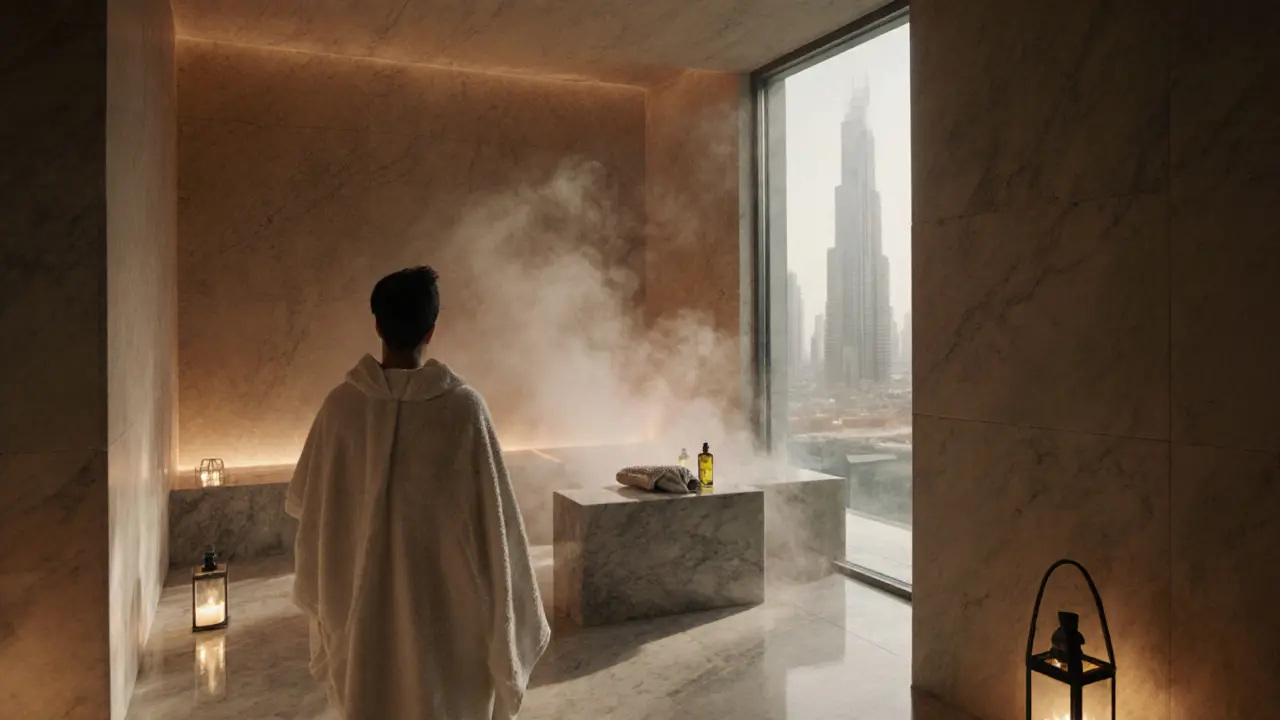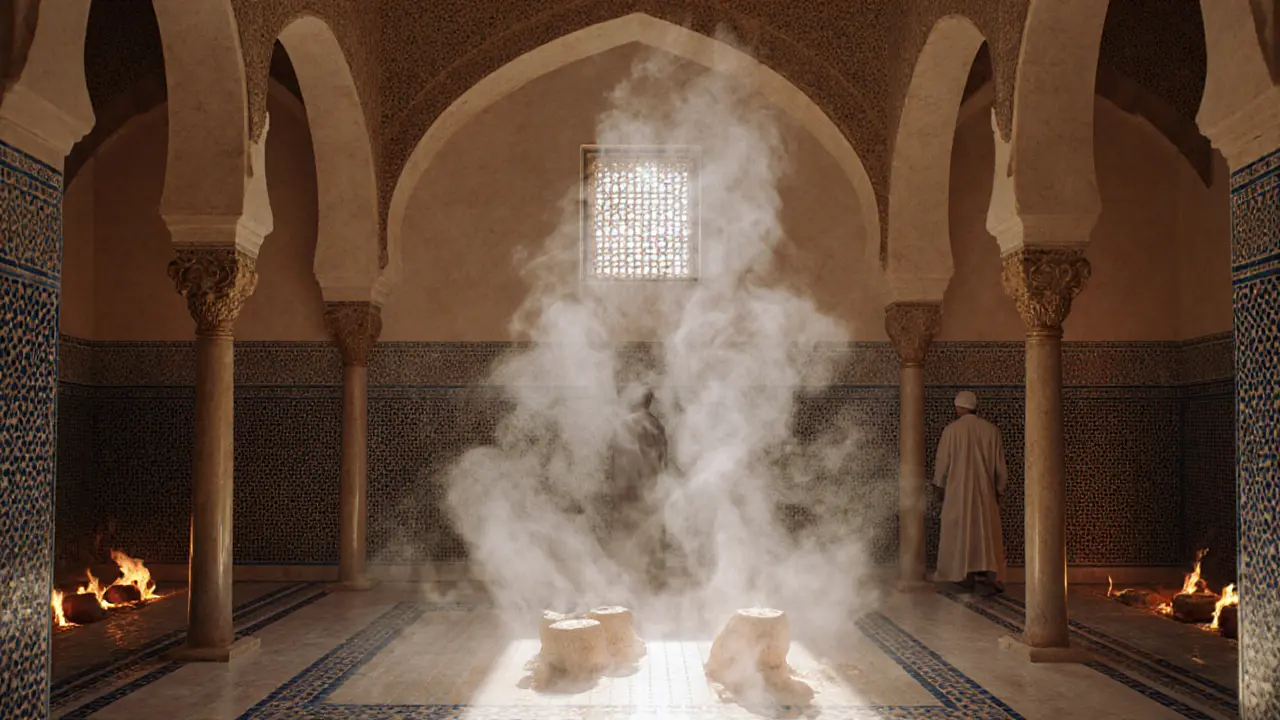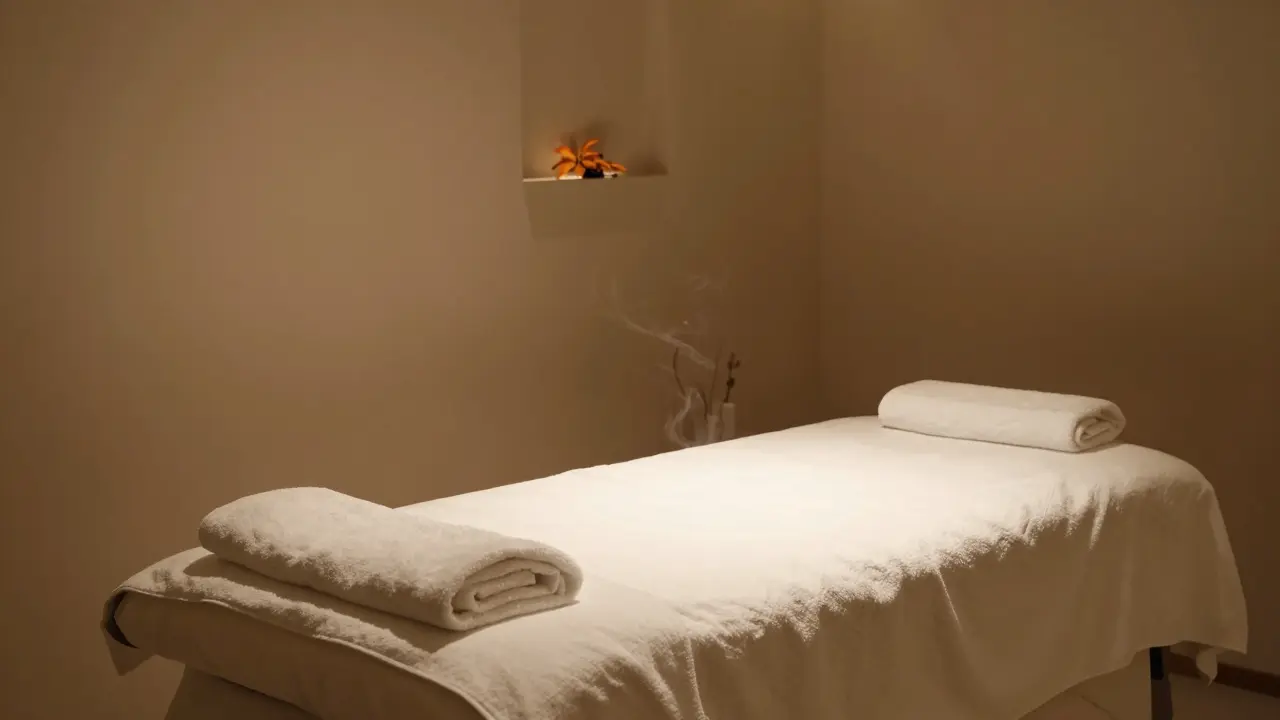Ever wondered why the hammam benefits get shouted about in Dubai wellness circles? The Moroccan‑style steam bath isn’t just a luxury rinse‑off - it’s a full‑body reset that hits circulation, skin, and stress all at once. Below you’ll find the science, the ritual, and practical tips so you can decide if a hammam session fits your health goals.
Understanding the Basics of Hammam
Origins and History
Hammam is a traditional Moroccan steam bath that traces its roots back to Roman thermae and later Islamic culture. Travelers first encountered it in North Africa’s bustling souks, where the hot stone‑heated rooms served both hygiene and social bonding. Over centuries, the hammam migrated to the Gulf, becoming a staple of Dubai’s luxury spa scene.
Core Principles or Components
A classic hammam session stacks three zones: the warm tepidarium, the scorching caldarium, and the cool frigidarium. The heat comes from molten stones placed under a marble floor, releasing moist steam that envelops the body. Gentle scrubbing with a kessa glove removes dead skin, while aromatic oils promote relaxation.
How It Differs from Related Practices
While a Finnish Sauna uses dry heat from a wood‑burning stove and an infrared sauna pumps radiant heat, a hammam relies on 100‑120 °F wet steam. A steam room (or Turkish bath) is similar but usually lacks the progressive temperature zones and cultural rituals. The table below highlights the key distinctions.
| Practice | Heat Type | Typical Temperature | Key Feature |
|---|---|---|---|
| Hammam | Moist steam | 100‑120 °F | Three‑zone progression, cultural ritual |
| Sauna | Dry air | 150‑190 °F | High heat, low humidity |
| Steam Room | Moist steam | 110‑120 °F | Constant humidity, single zone |
Who Can Benefit from Hammam?
Anyone looking for a low‑impact heat therapy can reap rewards - from athletes seeking faster muscle recovery to busy professionals craving a stress‑free pause. Even seniors find the gentle heat easier on joints than a dry sauna. The ritual’s social aspect also makes it popular for families and couples.
Benefits of Hammam for Body, Mind, and Skin
Improved Circulation
The humid heat dilates blood vessels, boosting flow to muscles and skin. Better circulation means more oxygen and nutrients reach tissues, which can accelerate recovery after a workout. The World Health Organization notes that heat‑induced vasodilation supports cardiovascular health.
Detoxification and Lymphatic Flow
Sweating in a hammam opens lymph channels, encouraging the removal of metabolic waste. While the body’s liver does the heavy lifting, the additional sweat‑out can complement a balanced diet.
Skin Exfoliation and Radiance
Steam softens the outer skin layer, making the traditional Kessa exfoliating glove used in hammam rituals glide effortlessly. Regular sessions can reduce keratin buildup, leaving skin smoother and more hydrated.
Stress Reduction and Mood Boost
Heat triggers the release of endorphins, the body’s natural feel‑good chemicals. Combined with quiet, dim lighting and aromatic oils, a hammam session can lower cortisol levels, helping you unwind after a hectic Dubai workday.
| Benefit | Description | Impact |
|---|---|---|
| Circulation | Vasodilation improves blood flow | Faster muscle recovery |
| Detox | Enhanced sweat‑out of toxins | Supports liver function |
| Skin | Deep exfoliation, hydration | Healthier complexion |
| Stress | Endorphin release, cortisol drop | Improved mood |
What to Expect When Engaging with Hammam
Setting or Context
Most Dubai spas house a dedicated hammam suite, often styled with mosaic tiles and soft lantern light. The temperature climbs gradually, so you’ll start in a warm waiting area before moving deeper into the hot chamber.
Key Processes or Steps
- Undress and wrap in a lightweight towel.
- Relax in the warm room for 5‑10 minutes to acclimate.
- Enter the hot steam room; stay 10‑15 minutes, breathing slowly.
- Allow a cool rinse or brief rest in the frigid area.
- Enjoy a gentle scrub with the kessa glove.
- Finish with a soothing oil massage if offered.
Customization Options
Spas often let you choose aromatic blends - eucalyptus for breathing, rose for romance, or amber for muscle relaxation. You can also adjust steam intensity or request a private suite.
Communication and Preparation
Let the therapist know if you have heart conditions, low blood pressure, or skin sensitivities. Hydrate before and after; a glass of water helps the body manage the extra sweat.

How to Practice or Apply Hammam at Home
Setting Up for Success
If you have a bathroom with a steam generator, you can mimic a mini‑hammam. Fill the tub with hot water, turn on the generator, and close the door to trap steam. Lay down a soft towel and dim the lights.
Choosing the Right Tools/Resources
A portable steam machine, a sturdy kessa glove, and a selection of natural oils are the core kit. Look for products labeled “organic” to avoid skin irritation.
Step‑by‑Step Guide
- Pre‑heat the steam generator (5‑7 minutes).
- Step inside, sit on a waterproof mat, and close the door.
- Stay 10‑12 minutes, breathing through the nose.
- Turn off the steam, take a lukewarm shower, and wipe with a warm towel.
- Use the kessa glove in gentle circular motions for 2‑3 minutes.
- Finish with a few drops of your chosen oil.
Tips for Beginners or Couples
Start with shorter steam periods (5 minutes) and work up to longer sessions. For couples, synchronize breathing and use the same oil blend - it turns the ritual into a bonding experience.
Safety and Ethical Considerations
Choosing Qualified Practitioners/Resources
When booking a Dubai spa, check that therapists hold certifications from recognized bodies such as the International Spa Association (ISPA). Read reviews that mention hygiene and staff professionalism.
Safety Practices
| Practice | Purpose | Example |
|---|---|---|
| Hydration | Prevent dehydration | Drink 500 ml water before session |
| Temperature monitoring | Avoid overheating | Leave if you feel dizzy |
| Skin check | Identify irritations | Skip exfoliation on open wounds |
Setting Boundaries
Communicate any comfort limits - for example, you might prefer a milder steam intensity or a shorter cool‑down period. A reputable spa will respect those cues.
Contraindications or Risks
People with uncontrolled hypertension, recent heart surgery, severe skin conditions (psoriasis flare‑ups), or pregnancy should consult a physician before trying a hammam. The heat can raise heart rate, which isn’t safe for everyone.
Enhancing Your Experience with Hammam
Adding Complementary Practices
Pair the steam session with a short mindfulness meditation or gentle yoga stretches. The warm muscles respond well to slow, intentional breathing.
Collaborative or Solo Engagement
Solo visits let you focus inward, while group sessions foster conversation and cultural appreciation. Both have merit - pick what feels right for your mood.
Using Tools or Props
Essential oils, a soft loofah, and a heated stone pillow can deepen relaxation. Some spas offer heated marble seats that keep the back warm while you rest.
Regular Engagement for Benefits
Most wellness experts suggest 1‑2 sessions per month to maintain circulatory and skin benefits without over‑taxing the body’s thermoregulation.

Finding Resources or Experts for Hammam
Researching Qualified Experts
Search for spas that advertise “authentic Moroccan hammam” and verify the staff’s training. Look for affiliations with Dubai’s Health Authority to ensure compliance with local regulations.
Online Guides and Communities
Forums like Reddit’s r/DubaiWellness and wellness blogs by Dubai‑based therapists often share tips on choosing the right steam temperature and oil blends.
Legal or Cultural Considerations
In the UAE, public bath facilities must meet strict hygiene standards. Ensure the spa follows the Dubai Municipality’s guidelines for water quality and sanitation.
Resources for Continued Learning
Books such as “The Art of Hammam” by Leila Benatik and YouTube channels focused on North‑African spa traditions can deepen your understanding.
FAQ: Common Questions About Hammam
What should I expect during a hammam session?
You’ll move through three temperature zones, spend about 20‑30 minutes sweating, get a gentle exfoliation with a kessa glove, and finish with a cool rinse. The environment is warm, steamy, and often scented with natural oils.
How does hammam differ from a sauna?
A sauna uses dry heat (often 150‑190 °F) with low humidity, while a hammam relies on moist steam at lower temperatures (100‑120 °F). Hammam also includes cultural rituals like the three‑zone progression and exfoliation.
Is hammam safe for beginners?
Yes, provided you stay hydrated, inform the therapist of any health conditions, and start with shorter steam periods. Most spas tailor the experience to first‑timers.
Can I do a hammam at home?
You can approximate the experience using a bathroom steam generator, a kessa glove, and natural oils. The key is maintaining consistent steam temperature and keeping the space well‑ventilated.
What health benefits are backed by research?
Studies from the World Health Organization and the American Heart Association note that regular heat therapy can improve vascular function, aid muscle recovery, and reduce stress hormones. While more research is needed on long‑term skin effects, anecdotal evidence strongly supports exfoliation benefits.
Conclusion: Why Hammam Is Worth Exploring
The hammam delivers a combo of circulatory boost, detox support, skin renewal, and mental calm - all wrapped in a culturally rich ritual. Whether you visit a Dubai spa or set up a simple steam corner at home, the practice offers a gentle, non‑invasive way to enhance well‑being.
A Path to Consistent Wellness
Incorporating a monthly hammam session can become a reliable pillar of your self‑care routine, much like a weekly yoga class or a regular massage.
Try It Mindfully
Start slow, respect your body’s signals, and consider a professional therapist for the first few visits. A mindful approach ensures you reap the benefits without over‑exertion.
Share Your Journey
Have you tried a hammam in Dubai? Drop a comment below - we love hearing about real experiences. And don’t forget to follow our blog for more wellness tips and spa guides.
Some links may be affiliate links, but all recommendations are based on research and quality.







Jason Parker
October 20, 2025 AT 18:30I’ve been going to a hammam in Dubai a few times now and I can honestly say the heat does wonders for sore muscles and the steam feels like a gentle hug for the mind. The three‑zone progression really helps my circulation ramp up gradually, so I never feel light‑headed. After the scrub my skin feels soft, almost like it’s been renewed. I also appreciate the quiet moments; they’re perfect for resetting after a hectic workday. Hydrating before and after is key, otherwise you’ll leave feeling drained.
Jessica Montiel
October 27, 2025 AT 16:10Oh great another post about steam rooms like we needed more hype about getting sweaty in the desert.
Natalie Norman
November 3, 2025 AT 14:50Beware the dramatic hype! The whispers of magic steam are nothing but ordinary heat and water. Yet, the ritual does hold a certain charm, a simple dance of steam and stone. Your breath becomes mist, your skin softens, and the world pauses. No lofty claims, just a modest reprieve.
Nithin Kumar
November 10, 2025 AT 13:30For those thinking it’s just a fancy spa, remember the ancient roots – it’s a cultural tradition, not a gimmick 😊. The stone‑heated floors and the steady steam can actually improve blood flow, which many athletes swear by 🧖♂️. Just don’t forget to listen to your body.
Helene Gagnon
November 17, 2025 AT 12:10They don't tell you that the real reason they push hammam is to hide the chemicals they add to the water you inhale.
Sarah Fleming
November 24, 2025 AT 10:50Indeed, the therapeutic value of moist heat, when considered, invites a contemplation of the delicate balance between body, mind, and the subtle aromatics that linger, suggesting, perhaps, an intricate dance of physiological response, and, consequently, an elevated state of well‑being, which, in turn, may foster a deeper appreciation of self‑care rituals.
Grace Shiach
December 1, 2025 AT 09:30The benefits are clear: improved circulation, skin exfoliation, and stress reduction.
Rob Schmidt
December 8, 2025 AT 08:10Our country’s wellness options beat all imported steam rooms.
Dan Helmick
December 15, 2025 AT 06:50Ah, the hammam – the ultimate playground for those who love to pretend that ancient rituals are somehow superior to modern science, isn’t it? One steps in, expects a mystical transformation, only to be greeted by hot steam and a stone floor, as if that alone can rewrite the laws of physiology. The three‑zone concept sounds impressive, yet it’s essentially a controlled sauna with a fancy name. Of course, the exfoliating glove adds that ‘exotic’ flair, making you feel like a royalty from centuries past. The purported circulation boost is nothing more than a temporary vasodilation, a common response to any heat exposure. And the detox claim? Your liver and kidneys have been handling toxins long before you tried a scented steam room. Still, the narrative sells – “authentic Moroccan experience” – a perfect marketing hook in a city that thrives on luxury. The soft lighting and aromatic oils are designed to lull you into a state of complacency, where you forget you’re paying a premium for hot air. Yet, for some, the ritual does provide a mental break, a moment of mindfulness amid a chaotic schedule. So, while the science may be modest, the cultural packaging is undeniably clever. In the end, whether you view it as a harmless indulgence or a glorified sweat session is up to you.
Juhi Edwin
December 22, 2025 AT 05:30Everyone has their take on hammam, and that’s okay. I’ve tried the full three‑zone flow and felt a gentle lift in my mood, but I also respect that some folks prefer a quick steam burst. If you’re new, start with a short session and see how your body reacts. It’s all about personal comfort and making the experience work for you.